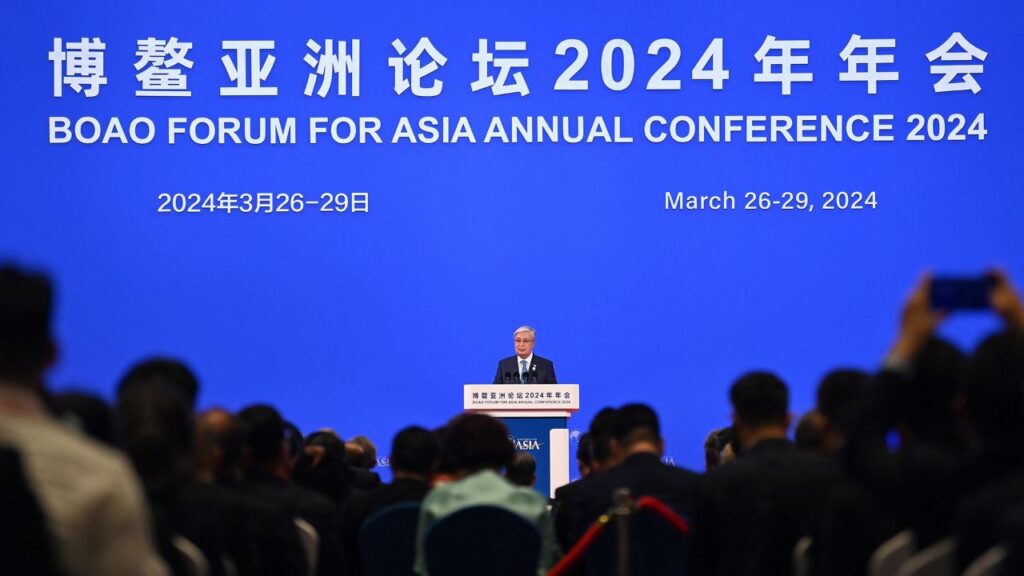Asian Renaissance. President Tokayev shares his vision for Asia’s role in global economy

According to President of Kazakhstan Kassym-Jomart Tokayev, the global economy needs a new paradigm for future development amidst trade issues and slowed growth of the global GDP. He also noted that Asia’s share in the global GDP will increase this year to 60%. So far, the region accounts for 53% of the world’s GDP. As he highlighted during his speech in China at the Boao Forum for Asia, all these and other factors suggest that the Asian Renaissance is coming.
Tokayev blamed trade disputes and protectionism policies across the world for global supply chain disruption, a slowdown of global growth and a lack of trust among investors. He also said that Asia is playing «the leading role on its way to a new age of sustainable growth.» He also mentioned several factors that suggest the Asian Renaissance.
«There are several economies in Asia which are the biggest and the most dynamic in the world. Foreign direct investments in Asian countries have significantly grown over the past few years. The region is the hub for the leading international tech centers that account for 70% of all patent developments. The continent has plenty of human resources, while 21 out of 30 of the biggest cities in the world are located in Asia. By 2030, the total amount of global consumption will grow by $30 trillion, while Western economies will account for only $1 trillion of this growth,» Tokayev said.
The president also said that Asia has «great potential for stimulating global growth and development in the years to come.» Asia’s role in defining the future of the world can be crucial.
Kazakhstani-Chinese relations as an example of trade partnership
President Tokayev has cited the partnership between Kazakhstan and China as an example of win-win cooperation. So far, Kazakhstan accounts for more than half of the Chinese trade and investments in Central Asia. In 2023, the turnover between Kazakhstan and China rose to a record-high rate of $41 billion as freight traffic grew by 22%, reaching 30 million tons. Furthermore, Kazakhstan accounts for 80% of all cargo shipping between China and Europe by land under the Belt and Road Initiative. The country must use this benefit to the fullest, Tokayev underlined.
He also pointed out that the Trans-Caspian International Transport Route (TITR) serves as a reliable logistic vein between Asia and Europe. Last year, the route reported a twofold increase in cargo shipping to three million tons. This rate is expected to reach 10 million tons in the next few years. Kazakhstan is ready to cooperate with all its neighbors in promoting the International North–South Transport Corridor, the president emphasized.
The leader of Kazakhstan has once again invited investors from Asia to take part in the development of the country’s economy and by doing so «open new ways for mutually beneficial cooperation.» Tokayev said that the open-door policy, abundance of natural resources and liberal market reforms in Kazakhstan have already attracted many foreign companies, including those from China.
What can Kazakhstan do to help the world cope with crises?
According to Tokayev, there are some challenges the international community won’t solve unless it is united. For instance, the world needs a new multilateral trade system based on the principles of fairness and openness. Many of these trade issues might be solved with the help of digitalization, Kazakhstan’s president noted.
«We need these new approaches in the global financial system as well. Equal opportunities for all countries, not just for chosen ones, must be a bedrock of this system. The Asian bond market is massive; it has a huge market cap and possesses great potential for many development projects,» Tokayev highlighted.
As he noted, the Eurasian Development Bank is going to issue its first panda bonds (Eurobonds nominated in yuan) as a new financial tool for investments. It might be used for financing global infrastructural projects.
Tokayev has also proposed using the agricultural potential of Kazakhstan to ensure global food security. Even though Kazakhstan harvested 12.11 million tons of winter and spring wheat last year, which is a quarter less year-on-year, the country is still the leading producer of grain in Central Asia. The president has instructed the country’s cabinet to promote international cooperation through target programs, joint centers for innovative agriculture and transfers of new technologies.
The president of Kazakhstan also believes that the international community has to intensify cooperation in the field of artificial intelligence (AI) to facilitate the growth of the global GDP. He has supported the Global AI Governance Initiative proposed by China. Kazakhstan is also interested in cooperation with leading tech giants in Asia to implement joint innovative IT projects. Production of rare metals is another prospective sphere where different countries can cooperate, according to Tokayev.
«Rare earth metals have become a crucial component for a wide range of technologies. They are necessary to achieve Net Zero and are widely used in strategic sectors such as industry, digital technologies, space and defense. We are continuing work with our international partners to find an effective way to exploit our uranium, lithium, titanium and other rare metal fields,» Tokayev said.
The Boao Forum for Asia is held in the Chinese province of Hainan. The current 23rd forum is called «Asia and the World: Common Challenges, Shared Responsibility.» Apart from President Tokayev, the event was attended by Ban Ki-moon, the head of the conference and former secretary general of the UN, President of Nauru David Adeang, Prime Minister of Sri Lanka Dinesh Gunawardena, Prime Minister of Dominica Roosevelt Skerrit, Secretary General of the Organization for Economic Cooperation and Development Mathias Cormann and many other leaders.

